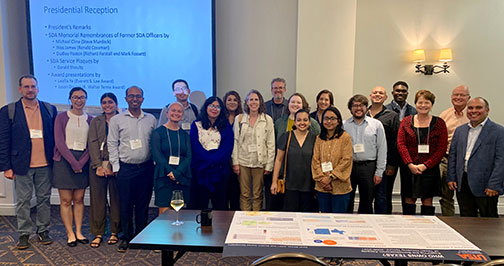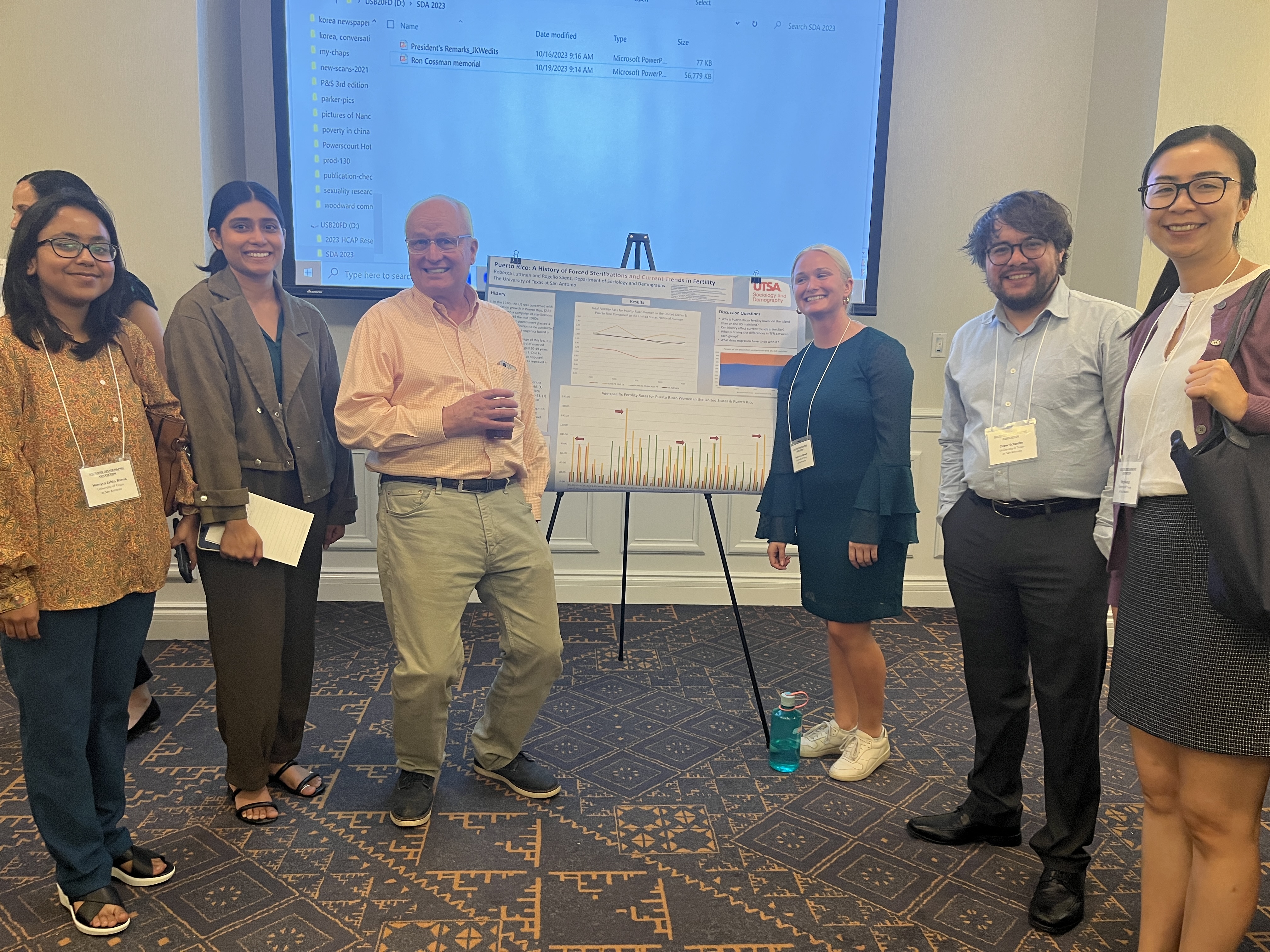Posted on October 25, 2023 by Amanda Cerreto

participants
The Southern Demographic Association (SDA) is a scientific and educational organization comprised of persons with professional interests in demography and population studies. Since 1970, SDA holds an annual meeting to provide a venue to present academic and applied demographic research, discuss and learn about population issues and to meet others with common interests.
Kara Joyner, professor of sociology and demography at UTSA, serves as the president of SDA and was the local organizer for the conference. She is also Co-Editor of the journal that the SDA sponsors (Population Research and Policy Review.) Julia Wolf, senior grant development manager, is SDA’s vice president, the newsletter editor, and also serves on the board of directors.
“What’s special about the SDA is how well our members work together to promote the success of the organization,” Joyner said. “This year we used social media to showcase the events at the conference. The turnout was the highest it has been since I began attending the meetings in 2018.”
UTSA and HCAP were well-represented at the conference. More than two dozen students and faculty presented on a range of topics, from family and marriage and LGBT research to population trends and gentrification.
“The Southern Demographic Association has been my academic home since I began graduate school. I am honored to have had San Antonio and UTSA host it again—as we last did in 2014,” said Lynne Cossman, dean of the College for Health, Community and Policy. “To have UTSA and HCAP so well-represented on the program is an excellent way to highlight all the amazing work across the college’s department and centers and institutes. Kara Joyner did excellent work bringing a vibrant program and excellent meetings to life.”

HCAP Presentations
- The Effects of LGBT Community Connectedness on Alcohol Consumption among Sexual and Gender Minorities: Michael Segovia ’23; Johnelle Sparks, professor
- Structural Heteropatriarchy and Marriage: Evidence from the 2021 ACS: Kara Joyner, professor
- Trends in Deaths of Despair in Texas, 2000 to 2020: Camerino Salazar, doctoral candidate
- Exploring the relationship between gentrification and neighborhood health in Bexar County, Texas: Christina Quintanilla-Munoz, doctoral candidate
- Race and Place: Uncovering Spatial Disparities Through Population Weighted Centers of Population: Drew Schaefer, doctoral candidate; Lynne Cossman, dean and professor; Jacob Souch, doctoral candidate; Julia Wolf, senior grant development manager
- Do Religious Struggles Mediate the Association between Neighborhood Disorder and Health in the United States?: Terrence Hill, professor
- Old-Age Care Across Borders: US Migration Policy and Kin Support in Mexican Families: Fernando Riosmena, professor; Leafia Ye, University of Wisconsin-Madison; Jenna Nobles, University of Wisconsin-Madison
- Obesity and All-cause Mortality in the Hispanic Population by Nativity and Length of Stay: Daniel Mamani, doctoral candidate
- Traumatic Brain Injury Exposure and Racial and Ethnic Mortality Disparities in US Military Veterans and the Total US Population: Jeffrey Howard, associate professor
- Overburdening of Abortion Clinics in Post-Roe America: Problems of Access and Allocation: Jacob Souch, doctoral candidate; Lynne Cossman, dean and professor; Drew Schaefer, doctoral candidate; Julia Wolf, title
- Debt and transition to parenthood using NLSY97: Cristina E. Martinez, doctoral candidate
- Who do Americans think should provide health-related services and how effective do they think the government is at doing so?: Julia Wolf, senior grant development manager; Lynne Cossman, dean and professor
- Applicability of the Night Time Light Data as an Ancillary Tool to Estimate the Population at the County Level of Texas: Muhammad Salaha Uddin, special research associate; Lloyd Potter, professor and Texas State Demographer
- Social Isolation and Risk of Dementia: Do Race-Ethnicity and Gender Matter?: Zhiyong Lin, assistant professor
- Puerto Rico: A History of Forced Sterilizations and Current Trends in Fertility: Rebecca Luttinen, doctoral candidate; Rogelio Sáenz, professor
- Examining Syndemic and Psychosocial Factors: Impacts on HIV Diagnoses among Historically Marginalized Communities in Texas: Adolph "AJ" Delgado, doctoral candidate; Rogelio Sáenz, professor; Johnelle Sparks, professor
- Who Owns Texas? Exploring the Socioeconomic Aspects of Texan Housing Tenure, 2006-2021: Sarah Serpas, doctoral candidate
- There Goes the Neighborhood? The Effects of Nearby Corporate Home Purchases on Long-term Homeowners in San Antonio Neighborhoods: Sarah Serpas, doctoral candidate; Esteban López Ochoa, assistant professor, Center for Urban and Regional Planning
- Women's Substance Use Disorders in Young Adulthood and the Effects of Treatment and Adolescent Health Lifestyle: Sarah Sharmin, doctoral candidate; Johnelle Sparks, professor
- Life course disadvantaged neighborhood exposure and the onset of multimorbidity in mid- to late-adulthood: Ying Huang, assistant professor; Fernando Riosmena, professor; Jianfeng He, University of Texas at San Antonio; Solveig Cunningham, Emory University
- The Role of Maternal Education in Predicting Opportunity Youth Status in the US: Joseph Jaiyeola, doctoral candidate
- Pandemic Job Separation and Psychological Distress: Modeling Chains of Adversity: Terrence D. Hill, professor
- State Housing Policies and Renter Mental Health during the COVID Pandemic: Brian Surratt, doctoral candidate; Kara Joyner, professor
- Housing Policy, Residential Segregation, and Life Expectancy in San Antonio, Texas: Bryan Solomon, doctoral candidate
- Rental Affordability in Texas, 2021: Monica Cruz, senior research associate; Muhammad Salaha Uddin, special research associate; Brian Surratt, title; Sarah Serpas, doctoral candidate; Emmanuelle Maher, graduate research assistant; Helen You, associate director; Lloyd Potter, professor and Texas State Demographer
- It’s Not Our First Plague: Gay Men and the Covid-19 Vaccine: Marcus A. LaFrenz, doctoral student

